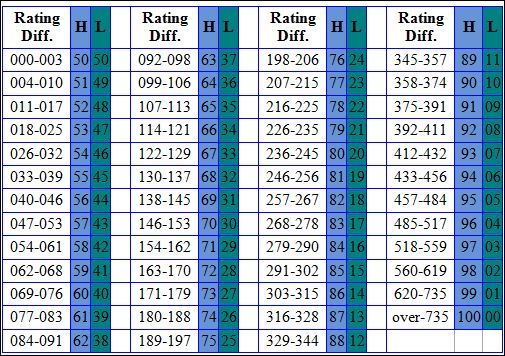For all ratings the likelihood of beating* a player rated 100 points lower is 66% or 2/3rds.
In other words if the higher rated player wins 2 games and loses 1, then their rating will end up back where it started because the rating system expected them to score ~66% and they did. This is for 1100 vs 1000 or 3100 vs 3000.
200 points is roughly 3 out of 4.
400 points is roughly 9 out of 10.
*The rating system doesn't distinguish between a player scoring 2 draws and a player scoring 1 win and one loss, so two draws and a win out of 3 games is also 66% and the rating would stay the same.

what are the different characteristic of 2000-2500 rapid and blitz and the percentage of beating -100 rated player